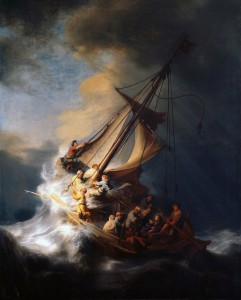 The Gospel testifies that Jesus worked many miracles. Today we hear that with his voice, with his words, he was able to quell the storm. The wind ceased and there was “a great calm.” Isn’t it true that when we hear miracles like these we grow expectant of miracles in our own lives? We are even tempted to think sometimes that if God were truly God, or if God truly cared about us, the storms of this world would never touch us. Or even if the storms came, some profound payer would bring a miracle and calm. How can we expect this when according to the Gospel, it was Jesus who sent the disciples into the storm? It was Jesus who said, “Let us go to the other side.” And even after he calmed the storm, it was Jesus who questioned them saying, “Why are you terrified? Do you not yet have faith?” None of us likes to suffer the storms of the world, yet that is precisely where Christ sends us. Not to be afraid, but to have trust. This is one message of today’s Gospel.
The Gospel testifies that Jesus worked many miracles. Today we hear that with his voice, with his words, he was able to quell the storm. The wind ceased and there was “a great calm.” Isn’t it true that when we hear miracles like these we grow expectant of miracles in our own lives? We are even tempted to think sometimes that if God were truly God, or if God truly cared about us, the storms of this world would never touch us. Or even if the storms came, some profound payer would bring a miracle and calm. How can we expect this when according to the Gospel, it was Jesus who sent the disciples into the storm? It was Jesus who said, “Let us go to the other side.” And even after he calmed the storm, it was Jesus who questioned them saying, “Why are you terrified? Do you not yet have faith?” None of us likes to suffer the storms of the world, yet that is precisely where Christ sends us. Not to be afraid, but to have trust. This is one message of today’s Gospel.
When we are children we dream of a life of perfection. A perfect career, a perfect wife or husband, a perfect marriage, perfect health etc. At various moments of our lives, when we are particularly moved by the Holy Spirit, we dream of being a perfect disciple of God, a saint. In all of our dreams, we never imagine the difficulty, the storms. Sometimes the storms are a result of our own failings, sometimes the result of others, and sometimes they are no one’s fault in particular, mysteriously caused by the fallenness of the world.
In the first reading we hear God speaking to Job about his sufferings and his plight. Job expected that because he was a holy man, he needn’t experience the storms of life. But how does God respond? He responds by telling Job that it wasn’t Job who was in control or who created the world. God had allowed his sufferings, his plight for a purpose. Job could seek to understand their purpose, he could pray to God to alleviate them, but he mustn’t try to teach God a better way. That would be lack of faith. God is God, and his way of bringing about our salvation, a heavenly people includes the storms of life.
It is interesting to consider exactly why Jesus calmed the storm when the disciples cried out. It seems that it wasn’t because Jesus was afraid of the boat sinking, but because he wanted to teach them something. As a teacher needs quiet before she can give her lesson, Jesus tells the storm, “Quiet. Be still”, so that he can teach the disciples. He teaches them not to fear and to trust in him. Jesus calms the storm with his voice. Only God would be able to do this. All of the miracle stories have this deeper purpose, not to be promises of life without storms, but miracles are living parables, opportunities to learn some truth of our faith.
As this is Father’s day, let us look at marriage and parenting. Marriage is a sublime expression of God’s love. A man and a woman give themselves to God, and God gives them the vocation of marriage. God gives each one to the other, and God’s love is the source of their love. When we look upon a married couple we are to see the love that Jesus has for the Church. And when we look upon their children, we are to see the fruitfulness and creativity of God. We might expect that God would keep such a sublime thing, marriage free of the storms of this world, but he doesn’t. Husbands and wives experience the storms of the world. They may become afraid or even tempted to abandon ship, but with the gift of faith they can remain faithful, stay in the boat, and ride out the storms with Jesus and his Spirit. When we get to the other side, where Jesus is calling us, we will see the great good that our beloved mothers and fathers have worked through faith even in the midst of storms.
When we hear of the miracle stories in the Gospel, we easily grow in expectation that the Christian life is free of storms. But this is not the case. God sends the disciples and us directly into a storm. We are on a “journey to the other side”, only in heaven will we find enduring peace and the freedom from storms. For now, we trust in God and have no fear. This is the gift of faith. This is the grace of God’s presence with us.

